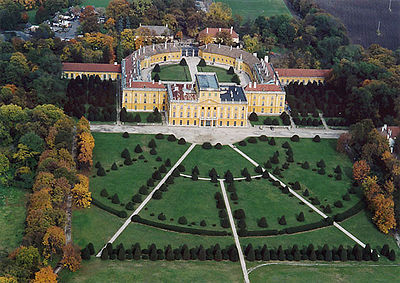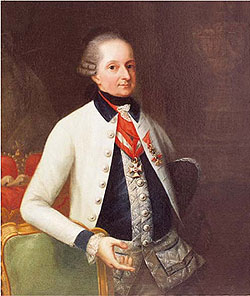Last week, I gave a version of this entry at a fundraising event, and later found myself thinking that its underlying message applies to many arts communities. Perhaps it will remind all of us that the structures of support are now communal. The vision that could be accomplished by one powerful man from over two hundred and fifty years ago, must now belong to the community as a whole.

Imagine it is 1766, and you are a prince. You have built a palace in rural Hungary, and you love music. Five years ago, in 1761, your brother had discovered a young, very talented musician and hired him to become Vice-Kapellmeister. Now, in your reign, when the elder Kapellmeister dies, you ensure that the young man assumes the top musical position at the palace.
You have an orchestra, and an opera stage, and you invite musicians from near and far to stop by and visit you, each time telling your Kapellmeister that he should take note of them. He is a composer, this Kapellmeister, and he writes music for you every week. He writes symphonies, operas, and string quartets, and even music for your own favorite instrument, the baryton. He brings glory to your palace because his commitment to music mirrors your own. Having his music in this special place says as much about you and what you value as the beautiful gardens and grand architecture surrounding you.
The symphonies are so incredible that they are published and performed around Europe, and the Kapellmeister’s fame grows, along with your palace’s reputation.
 Because of this remarkable musical community, many now know your name, Nikolaus Esterházy, as well as the grand palace you built: Eszterháza. Over the next three decades, your composer-Kapellmeister, Joseph Haydn, will preside over the music in this remarkable place. Since Eszterháza is isolated from Vienna, Haydn will often be lonely for the companionship of other musicians from that city. But, when the palace is closed up at the end of each season, Haydn, like many of the others in your retinue, will return to Vienna, where he lives during the rest of the year. He has friends there, including a young, immensely gifted composer named Mozart. Through their friendship they challenge each other to grow.
Because of this remarkable musical community, many now know your name, Nikolaus Esterházy, as well as the grand palace you built: Eszterháza. Over the next three decades, your composer-Kapellmeister, Joseph Haydn, will preside over the music in this remarkable place. Since Eszterháza is isolated from Vienna, Haydn will often be lonely for the companionship of other musicians from that city. But, when the palace is closed up at the end of each season, Haydn, like many of the others in your retinue, will return to Vienna, where he lives during the rest of the year. He has friends there, including a young, immensely gifted composer named Mozart. Through their friendship they challenge each other to grow.
Years go by, and you, as the prince, become old and pass away. Your son takes the reins. He cares much less about music, and money is tight. He cuts his expenditures dramatically, and it doesn’t take long for Haydn to realize that the magic of Eszterháza has passed on along with you. The entire musical enterprise is closed, and Haydn, released from the terms of his long, exclusive contract, writes music for Paris, and for London, and Vienna too. Later he’ll even teach a young, promising composer named Beethoven.
During his lifetime, Haydn will compose over 100 symphonies, develop the new genre of the string quartet, and set the standard against which Mozart will be measured. He’ll be the most famous musician of his age, and all of this because of you.
And that leads me to think of ripples.
Each one of us lives a life based on our values. We gradually form them, nurture them, and ultimately, become them. Behind us, we leave ripples of our having been here. Behind us, things happen: Some, because we decide to make a difference; others, the unanticipated results of the things we choose to do.
Because Prince Nikolaus recognized talent and nurtured it, Haydn found his way out of anonymity and into History. The story of music changed. Because of his stature, Haydn would find Mozart, and Beethoven would seek out Haydn. But Prince Esterházy could see none of that. He simply saw that around him he wanted music of the highest order.
We all know that there are no more Eszterháza Palaces and no more people like Prince Nikolaus Esterházy. Well, actually they remain, but in other forms and other roles. The palaces are now tourist spots, and today we have concert halls and auditoriums. There are orchestras in many cities, supported not by princes, but by people like us.
And there are still ripples. Because of the actions behind us, we are here today, and beyond today, our ripples will continue to work their way forward. It seems to be time to throw a stone into the water, believing that
you’ll leave something behind. We’re only part of the story, but we’re an essential part. This can’t be done by one of us alone. We don’t need Prince Nikolaus Esterházy. We need a community of like-minded stone-throwers instead.

Well put-bravo!